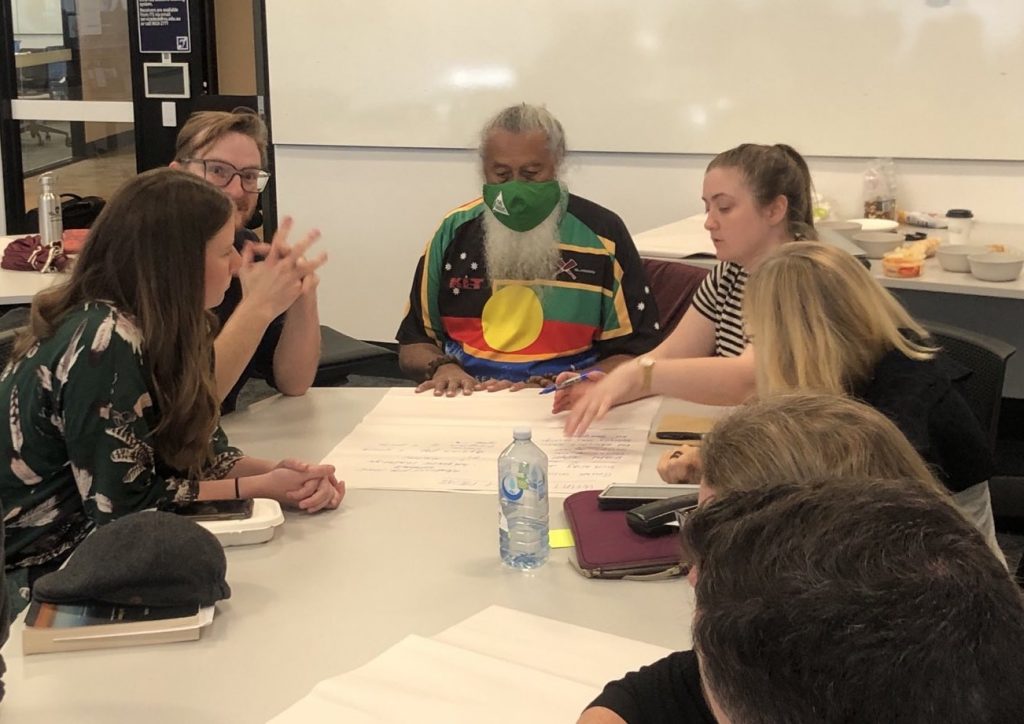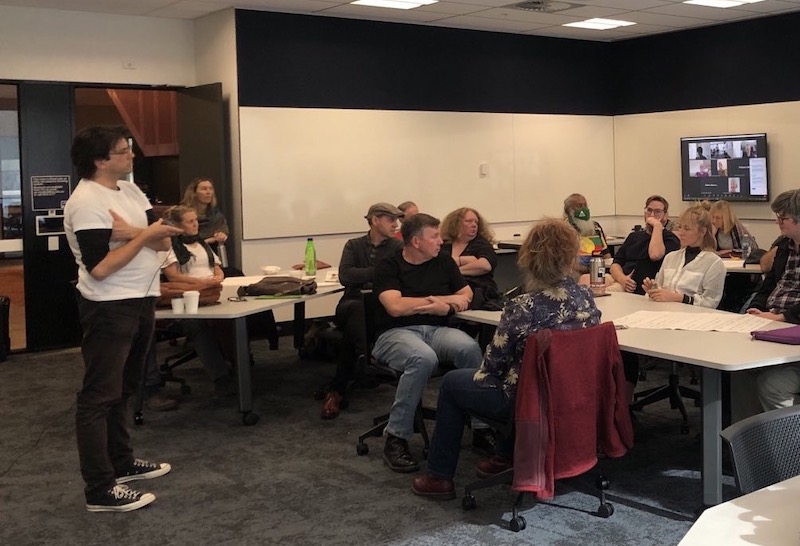Talking Power And Change
Strategic Planning Workshop Reading Material
As part of the Australian Greens Strategic Planning process, all Greens members around the country are invited to take part in a half-day workshop to reflect deeply on what we are trying to do as a political party and a movement for change.
These workshops, which I am facilitating for the Green Institute online and in person between late April and early June, are about bringing the party membership together around shared understandings of political power, how change happens, and what the specific role of the Australian Greens is in the current historical and political context. They will contribute to the development of a clear, actionable theory of change that will guide our strategic goals and actions for the next 10 years.
And that’s important – it’s hugely important that we are a grassroots party involving any and all members in developing our strategy!
But I want to emphasise that the process is as important as the outcome – the strategy itself. Engaging members in an inclusive, collaborative, consensus-driven discussion, collectively exploring understandings of political power, its different forms, and its potential uses and limitations for achieving our long-term goals, as well as theories of change related to those understandings of power – these workshops will help us get better at politics, at democracy, at change-making. And my hope is that they will be one step in that process, not just for the strategic planning, but the beginning of a new practice of thinking and discussing what we’re doing and why.

In my book, Living Democracy, I quote the amazing philosopher, Hannah Arendt, who said “All political institutions are manifestations and materialisations of power; they petrify and decay as soon as the living power of the people ceases to uphold them”.
That is why we need to keep doing strategic planning, keep returning to, re-evaluating, re-prosecuting these questions. The Greens are a political institution, operating within a system of other institutions. We mustn’t allow ourselves to petrify and decay. We have to keep reinvigorating our living power as we seek to do the same with the larger institutions around us.
This blog post is to help members who are attending these sessions prepare for the discussion by starting to think about the questions in advance – a half-day workshop is a big commitment for members, but it’s frankly not very much time to discuss these huge and complex issues.
At its core, strategic planning is about challenging ourselves to question our assumptions.
In a sense, that’s what Arendt was getting at – that we come to rely on assumptions about how we work, how we should work, and that can be calcifying. Assumptions underlie everything we do when we are trying to achieve change of any kind – whether it be how we ask our child to tidy their room or how we work to confront the climate crisis.
And these assumptions are based on our understandings of power, and our theory of change.
We need to challenge and question our assumptions – not because they’re definitely wrong, but because they need to be tested. Just because something has previously worked doesn’t mean it will definitely work again, for instance. Especially if the context has changed. And an approach that worked to deliver a specific win at local scale may not work to create large-scale, system-wide change. Of course.
Strategic planners often refer to these assumptions as “magical beliefs”. For many working for social change, these beliefs might be that writing to a Minister, or putting in a submission to an inquiry, will have a meaningful impact. For others, it’s that protesting longer and louder will. For us it can be that if we simply elect enough Greens, we will be able to implement our policies.
There’s some truth to each of these. There are also tremendous limitations to all of them. We need to test the assumptions, think more about the systems of power we’re working in, and develop a more sophisticated theory of change.
That’s what these workshops are hoping to seed.

We’re going to start by lifting ourselves out of the day-to-day practice of doing politics and looking at the global challenges we’re seeking to address. In small groups, we’ll discuss what we are really trying to do as a political movement, so we can think about power and change more deeply. I want you to have a bit of a think about that before you arrive – why are your really working for change through the Greens?
Then we’re going to talk about power.
Power is something we have very powerful assumptions about. Our social, economic and political structures enforce a particular view of it as inherently hierarchical, top-down, even coercive. But we all know that, alongside “power over”, we can find “power with” others, creating the “power to” make change.
As a political party, we’re also aware of parliamentary power, of executive power, of community power, of the power of vested interests, and much more. As the Greens, we’re committed to our four pillars of grassroots democracy, social and economic justice, peace and nonviolence, and of course ecological wisdom. What do they tell us about the legitimate exercise of power? And, as the Australian Greens, we are further committed to a project of decolonisation and Indigenous sovereignty, which again bring us to a set of questions about power, and contested relations of power.
Power can be thought of as the ability to achieve something. And it works in many ways – individually and collectively, institutionally and culturally, through coercion, through collaboration, through influence, through guidance.
I want you to think about your experiences of different types of power. And I want you to consider the types of power we want to cultivate and exercise as Greens. Are we seeking to take the reins of power as it currently exists, or are we seeking to challenge and change it, dissolve coercive power and distribute power across the community?
That’s going to lead us to theory of change.
A theory of change is a simple statement of “IF we do x THEN y will happen BECAUSE reason”.
Obviously, our theory of change (or theories, in fact, operating differently at different scales) draw deeply on our understandings of power. Thinking about how we see power operating today and how we’d like it to operate in the future guides us towards the path to change, the tactics and strategies we should use to create our future. If power is purely hierarchical, the only way to seek change is to beg or demand it of those with power over us, or by contesting positions of hierarchical power. If we envisage a future with more collaborative, collective, community power, we can work for change in a very different way. Remember: IF we do x THEN y will happen BECAUSE reason.
Again, I want you to think a little bit in advance about your experiences of change, at various scales – in your personal life, in politics, in the Greens, across society. We’re going to talk in small groups about those experiences, and about what they, and our understandings of power, can tell us about Greens theory of change, from the local to the global.
After an update on the broader strategic planning process, and a short break, we’re going to come back and plunge into the specifics of that: what changes are we trying to achieve?; what shifts are we trying to deliver in politics?; what very specific strategic goals should we set ourselves to deliver in the coming decade to make these shifts happen?
So, three questions to think about before you rock up, please:
- Big picture context: what global or social challenge(s) are you in the Greens to address? Why are we really doing what we’re doing?
- Power: what experiences of different types of power have you had? What kind of power should we, as Greens, be using and cultivating?
- Change: what experiences of change have you had, at various scales and in various contexts? How should we, as Greens, be working for change?
I look forward to seeing you, and starting this fantastic, fun, hugely important conversation!
Further reading
If you want to dig deeper into these questions, either before or after the workshop, here are a few suggestions
Marshall Ganz on power and theories of change
James Whelan on theories of change
Naomi Blackburn on theories of change, and different modes of power
Review and summary of Jane McAlevey’s “Organising for Power”
Marama Davidson, Greens Aotearoa co-leader, on the necessity of being “uncomfortable with power”
Max Chandler-Mather on the path to (effective) Greens government (video)
Caroline Le Couteur, former ACT Greens MLA, on her experience of Greens in government
Huong Truong on “The Work of Grassroots Organising”
Carys Hughes and Jim Cranshaw (UK) on the idea of a “left governmentality”
Mark and Paul Engler (USA) explore “What is co-governance?”
The Englers ask “What’s the problem with taking state power?”
Adam Lent (UK) on the idea of a “Community Power Act”
And, finally, a few things from me:
A recent piece on transformative politics, and working to change the system from within
At TEDx Canberra on the idea of transformative change (video)
At Arena on why “There’s no time left not to do everything”
If you’re really keen, my book, Living Democracy: an ecological manifesto for the end of the world as we know it
comments
Mercurius Goldstein says
Great reading list, thank you.
replies
Stephen Morris says
Will it be possible to include some discussion on Direct Democracy and practical strategies for promoting it?
replies
Crmatthewryansykes says
To stay a relevant alternative as an alternative to other political parties in terms of promoting participatory democracy within a political system, it would be good for the Greens to promote changes to electoral laws across all jurisdictions that require these parties to report on their constitutions and processes of changing them so that they can be tested for transparency and can be contested by members at law in Courts. Without such a change Courts are reluctant to interfere with inner workings of political parties to cast judgement which allows for very unjust outcomes and very educated people then leave the political debate of ideas which Greens, as a progressive political party looking to a green future for everyone, ought to be concerned about.
replies
Helen says
I can't attend the meeting. Some comments:
My life goal and my goal for joining the Greens is to contribute to combatting the exploitation for profit of people and planet without regard for the effects on either.
My specific focus has been on the relationship between climate change and mental health (see for example Berry et al. 2018 in Nature Climate Change). I would like to contribute my expertise in this area.
replies
Kbannister says
I am unable to attend the Greens Strategic Planning workshop however I totally support the idea of being the change we want to see. I e upholding grassroots democracy, community action, First Nations leadership and inclusion, privileging the voice of the poor and disadvantaged who know more about system failure than those of us who are privileged to have education, safe homes, a livable wage and easy access to wild natural places.
I think acting effectively locally can help build relationships , work effectively together and think together about transforming economies to serve the planet and the people rather than capitalism and shareholders.
I think we need political action now to sustain life on this planet. We need a mixture of local transformative change and national transformation.
replies
Add comment